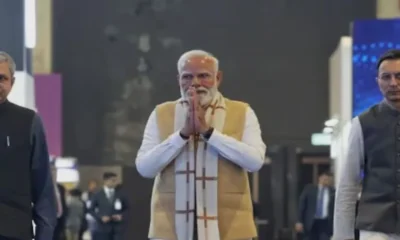In an early morning swoop, Pune police carried out raids on several Dalit and human rights activists in Delhi, Maharashtra, Telangana, Goa, Haryana, Chhattisgarh and Jharkhand on charges of suspected Maoist links.
Among those whose houses were searched are Vernon Gonsalves and Arun Ferreira in Mumbai, Gautam Navlakha in New Delhi, Sudha Bharadwaj in Faridabad and Stan Swamy in Ranchi.
Bharadwaj, who has worked as a human rights lawyer in Chhattisgarh for many decades, was detained at the Surajkund police station in Faridabad.
In Hyderabad, raids were reported from the homes of Varavara Rao and his family members, and two other activists, Kranti Tekula and Naseem.
The activists were detained and reports about some of them said they have been formally arrested. They include Varavara Rao and Kranti Tekula in Hyderabad and Gautam Navlakha in New Delhi. Both would be produced by Pune Police in local courts for transit remand after medical checkup. They were questioned for 4-6 hours after which they were arrested, said reports.
In Mumbai, the homes of Arun Ferreira, Vernon Gonsalves and Susan Abraham were raided. According to sources, the raids were conducted from around 6 a.m. at Ferreira’s Thane residence and the Andheri homes of Gonsalves and Abraham, said media reports.
Vernon Gonsalves is also a human rights lawyer and activist. Gonsalves and Ferreira were earlier accused of Naxalite connections, but were acquitted of related charges in 2012. Ferreira, who in 2012 was acquitted of charges of being a Naxalite, told Scroll.in that he has been involved in the case against Surendra Gadling, a Nagpur-based lawyer who was among the five social activists arrested in June on charges of stirring up violence in Bhima Koregaon.
Susan Abraham is a civil liberties lawyer and is part of the Committee for Protection of Democratic Rights (CPDR).
In Goa, the police raided professor Anand Teltumbde’s on-campus premises at the Goa Institute of Management (GIM), located in Sanquelim in North Goa, where he is a senior professor.
“He is out of Goa and his house was locked. He was informed by an official at the Institute that police had arrived at the campus with sanction to raid his house,” said media reports quoting an unnamed source at the GIM.
Prof. Teltumbde, who specialises in “strategy, productions and operations, project management, and business analytics” at GIM, is also a Dalit scholar, writer and social commentator.
The local police in some states, said media reports, were not involved in the raids nor were they informed.
The raids are said to be connected to investigations into a public meeting organised days before caste-related violence erupted at Bhima Koregaon near Pune on January 1. Rights activists said more raids are in progress in other parts of the country.
According to police, the searches are being conducted at the residences of the persons having Maoists links and who were directly or indirectly connected with the organizers of ‘Elgaar Parishad’.
Police claim the speeches made at the Elgaar Parishad, a day ahead of the bicentennial celebration of the battle of Bhima Koregaon, were one of the triggers to the violence that was witnessed in and around Pune the next day.
The police claimed that the names of these people had emerged in the interrogations of five activists and lawyers it had arrested in June in the same case. On June 6, it had arrested Sudhir Dhawale, leader of Mumbai-based Republican Panthers Jati Antachi Chalwal, Delhi-based activist Rona Wilson of Committee of Release of Political Prisoners, Nagpur lawyer Surendra Gadling of Indian Association of People’s Lawyers, Nagpur University professor Shoma Sen, and Mahesh Raut who had in the past been Prime Minister’s Rural Development Fellow.
While producing them in court the next day, Pune police had claimed that documents and information recovered from some of these alleged “top urban Maoist operatives” revealed plans to assassinate Prime Minister Narendra Modi in a “Rajiv Gandhi like manner” last year. All the five, charged under Unlawful Activities (Prevention) Act, are currently in being held in magisterial custody, and lodged in Yervada central prison in Pune.
The Pune police have been investigating the circumstances that led to violence at Bhima Koregaon, where large groups burnt and stoned vehicles and property. One person died during the clashes. An initial outcry focused attention on the role of Hindutva groups in instigating the violence.
In March, however, the state government said that there was no evidence against Shiv Prathishtan Hindustan leader Sambhaji Bhide who reportedly gave an inflammatory speech near the village of Bhima Koregaon days before the New Year violence.
Since June, the police investigation pivoted to focus on activists working with Dalits, Adivasis and political prisoners instead. The police have been claiming that speeches made at the public meeting in Pune, called the Elgaar Parishad, actually sparked the violence. The investigators have been targeting activists who they allege helped organise the meeting.
The Elgaar Parishad was organised to commemorate the 200thanniversary of the battle of Bhima Koregaon which happened on January 1 in 1818, in which a British army comprising of a large number of Dalit soldiers is said to have defeated the Peshwas. Every year on January 1, thousands of Dalits assemble in Pune and march to the village of Koregaon Bhima which has a war memorial (Jaystambh) in memory of those who died in that battle.
Police claim investigations had shown that banned Maoist groups were involved in financing and organising the Elgaar Parishad event.


 Latest world news20 hours ago
Latest world news20 hours ago
 Latest world news20 hours ago
Latest world news20 hours ago
 India News20 hours ago
India News20 hours ago
 Latest world news11 hours ago
Latest world news11 hours ago













